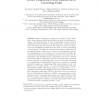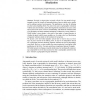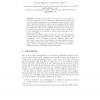659 search results - page 109 / 132 » Compiling and securing cryptographic protocols |
137
click to vote
EUROCRYPT
2007
Springer
15 years 8 months ago
2007
Springer
Abstract. Secure computation consists of protocols for secure arithmetic: secret values are added and multiplied securely by networked processors. The striking feature of secure co...
111
click to vote
ISW
2004
Springer
15 years 7 months ago
2004
Springer
Abstract. Recently we showed how to justify a Dolev-Yao type model of cryptography as used in virtually all automated protocol provers under active attacks and in arbitrary protoco...
145
click to vote
ICQNM
2008
IEEE
15 years 9 months ago
2008
IEEE
Coin flipping is a cryptographic primitive in which two spatially separated players, who in principle do not trust each other, wish to establish a common random bit. If we limit ...
118
click to vote
ACNS
2005
Springer
15 years 8 months ago
2005
Springer
Recently, several public key exchange protocols based on symbolic computation in non-commutative (semi)groups were proposed as a more efficient alternative to well established prot...
146
click to vote
PKC
2010
Springer
15 years 6 months ago
2010
Springer
In many practical settings, participants are willing to deviate from the protocol only if they remain undetected. Aumann and Lindell introduced a concept of covert adversaries to f...



